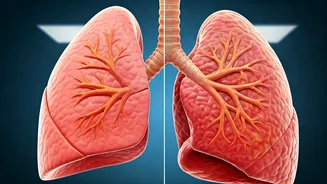Introduction: Lung Health
Our lungs are vital organs responsible for the essential process of respiration, which enables us to inhale oxygen and expel carbon dioxide, sustaining
our lives. However, various external factors, including the foods we consume, can impact lung health significantly. Many everyday foods, often overlooked in the context of respiratory health, can damage the lungs, making breathing difficult. This article delves into seven such foods and provides insights into why they can be harmful and offers potential alternatives for improved respiratory function. Understanding these dietary effects is crucial for anyone seeking to enhance their overall health and maintain optimal lung performance. Making informed food choices can directly contribute to easier breathing and a more comfortable life.
Processed Meats
Processed meats, including bacon, sausage, and deli meats, frequently contain high levels of nitrates and nitrites. These additives are used as preservatives to enhance flavor and appearance. However, when ingested, these compounds can trigger inflammation in the lungs. This inflammation may worsen existing conditions such as asthma and chronic obstructive pulmonary disease (COPD), leading to increased difficulty breathing. Furthermore, some studies suggest that the consumption of processed meats could be linked to an elevated risk of lung cancer. Considering these factors, reducing or avoiding processed meats can benefit lung health. Swapping them for fresh, unprocessed alternatives, such as grilled chicken or fish, offers a healthier choice, contributing to improved respiratory function and overall well-being. Focusing on whole, natural foods is a good choice.
Sugary Drinks
The overconsumption of sugary drinks, including soda, sweetened juices, and energy drinks, is linked to a number of health issues, including negatively affecting lung health. These beverages often contain high amounts of fructose, which can contribute to chronic inflammation throughout the body. Lung tissue, in particular, may become inflamed, leading to swelling and airway constriction. This can make breathing difficult and increase the chances of respiratory infections. Additionally, excessive sugar intake can lead to weight gain and obesity, which is often associated with breathing difficulties and a higher risk of developing conditions such as asthma. Choosing water, unsweetened tea, or naturally flavored beverages is a better approach to stay hydrated while also protecting lung health. Simple changes in diet can yield beneficial respiratory outcomes.
Dairy Products
Some people find that consuming dairy products, such as milk, cheese, and yogurt, can worsen their respiratory symptoms. Dairy products might stimulate increased mucus production in some individuals, which can make it harder to clear airways. This may lead to coughing, wheezing, and a feeling of chest congestion. Moreover, dairy allergies or intolerances can cause an inflammatory response, which will further aggravate respiratory conditions. People with asthma or allergies should pay close attention to how their body responds to dairy products. If dairy seems to exacerbate symptoms, exploring alternative options such as plant-based milks (almond, soy, or oat) can bring relief. Paying attention to individual bodily responses can help determine the best dietary choices for supporting lung health.
Salty Foods
Excessive salt intake can lead to water retention, which may place additional stress on the lungs. High sodium levels may contribute to swelling in the airways, making breathing more difficult. This is especially relevant for individuals with heart conditions or hypertension, as these conditions often go hand in hand with respiratory issues. Highly processed foods, fast foods, and salty snacks are particularly high in sodium, making it easy to consume more than the recommended daily allowance. Opting for fresh, unprocessed foods and seasoning with herbs and spices instead of salt can help minimize sodium intake and reduce the burden on your lungs. Monitoring sodium consumption is crucial for maintaining good lung health and overall health.
Fried Foods
Fried foods, which are often prepared in unhealthy oils, can cause several problems for your respiratory system. These foods tend to be high in saturated and trans fats, which can trigger inflammation throughout the body. This inflammation can cause airway constriction, making breathing more difficult, especially for people with existing respiratory conditions like asthma. Moreover, the process of frying food can produce harmful chemicals. These chemicals may irritate the lungs and contribute to various respiratory issues. By reducing the intake of fried foods and choosing healthier cooking methods, such as baking, grilling, or steaming, you can minimize exposure to harmful substances and protect your lungs. Making sensible food selections is a good method to improve respiratory health.
Refined Carbohydrates
Refined carbohydrates, like white bread, pasta, and pastries, are quickly broken down into glucose, leading to rapid blood sugar spikes. These fluctuations can trigger an inflammatory response in the body, which can affect the lungs. Chronic inflammation can cause the airways to narrow, making it challenging to breathe. Refined carbs often lack essential nutrients and fiber, offering little nutritional value while contributing to weight gain and obesity, which can also impact lung function. Swapping these for whole grains, such as brown rice, quinoa, and whole-wheat bread, provides sustained energy and supports better overall health, including respiratory function. Choosing whole, unprocessed foods can help keep blood sugar levels steady and reduce inflammation, contributing to healthy lungs.






















